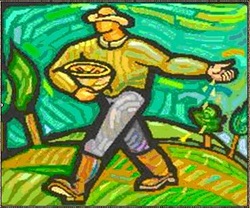
Sometimes the names we are used to calling things keep us from seeing their full value. This is certainly the case with Jesus’ teaching. A few years ago for instance, in some Christian quarters, we stopped referring to one of the Jesus’ great stories as simply ‘the Parable of the Prodigal Son’. It had become too predictable and limiting. Instead we also started referring to it as ‘the Parable of the Father’s Love’ and the Parable of the Two Sons’ as we started noticing other features in the story which are very life-giving. I suspect it is the same with the story Jesus tells in today’s Gospel reading. Maybe we should look at the so-called ‘Parable of the Sower’ in other ways, if we want to hear more of what God is saying to us through it.
Here are three suggestions…
So the question is, do we do the same? Are we extravagant and indiscriminate about how and where we share God’s generous love? I wonder…
I believe that today’s Gospel story is a very important passage for us to reflect upon as we ponder our mission and evangelism today. Can we, for instance, be as carefree and extravagant as the sower in sharing the gifts of love and grace which God has given us? Are we scattering God, or are we hoarding? Perhaps we should be more wasteful? Efficiency and effectiveness are important elements in our modern world, and they have a place in ordering our church life too. Yet the gratuitousness and generosity of God also call us to a more carefree extravagance.
Secondly, we might also call today’s Gospel story ‘the Parable of God’s Seeds’. For we are also challenged by it to a risk-taking sharing of God’s love. The interpretation of Jesus’ parable given to us in the Gospel text is not entirely helpful to us in this respect. Almost certainly it is an interpretation developed by the early Church to make their sense of their circumstances, in the face of persecution and much hardship. It is still very valuable for us, and God can speak to us through it. Yet, it also tends, at the risk of some self-righteousness, to encourage us to think only about who hears and who does not hear the Gospel. Perhaps however we might also look at it in another way. We might reflect on how we might be the seeds themselves and on how we might then let God, the sower, scatter us. Now that’s a bit tough, isn’t it? After all, if we are the seeds, we may also find we are sometimes vulnerable, or at risk of being scorched or choked. Sharing God’s love isn’t easy, Jesus is saying to us, and sometimes it won’t always work out. No wonder perhaps we are therefore often reluctant to share our gifts, or to take risks with how we do worship or ministry, or relate to younger people or use our church property and other resources. Maybe, like scattered seed in difficult places, we are a bit scared of failing if we try something new. If so, we will be right, Jesus seems to be saying. If we try out some new ideas of mission and evangelism, we can be assured, we will make mistakes, maybe even some big ones. We might waste some time, some money, some energy. We might find ourselves threatened by bids, scorched by the sun, or even choking at times. Yet, to rework the old saying, ‘the Church that never made a mistake, never made anything.’ Are we then willing to be scattered by God?
For a third, and even more evocative, name for today’s Gospel story would be ‘the Parable of the Miraculous Harvest’. After all, that is the punchline with which Jesus leaves us. The Sower is hardly mentioned after scattering the seeds. The real stress and climax of the story is the marvellous harvest, the ever so fruitful growth and multiplication of God’s love. In a way, like the growth of the Church in any place or generation, it is amazing it happens at all: such are the obstacles. Yet, however big or small the harvest, it is incredibly real. Such growth and fruitfulness are truly miraculous. As such, in our mission and evangelism, we are pointed back to the grace of God the giver. For, Jesus is telling us, we need not worry. Fruitfulness is a sign of the kingdom of God. It is a gift whose surprising nature and graciousness should open our hearts and lives to the mystery and love of God.
Of course, we are understandably reluctant to share in the carefree extravagance of God. Inevitably, we are resistant to being risk-taking seeds of God’s love: after all, Jesus himself landed among some pretty hostile birds, didn’t he?, on some very rocky ground and in some terrible thistles. Naturally, we cannot be fruitful, grow, as Church, as a community of love, or yield a harvest, by ourselves. Yet, like so much of the teaching of Jesus, we are reassured in today’s parable that God has it in hand, and we will bear fruit among us, if we trust ourselves to God.
So may we indeed share God’s carefree, extravagant, love with others; may we allow ourselves to be scattered as seeds of God’s love; and may we trust in the promise of harvest. Amen.
 RSS Feed
RSS Feed